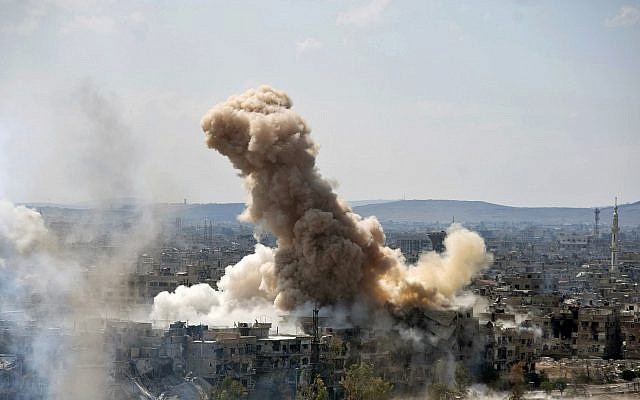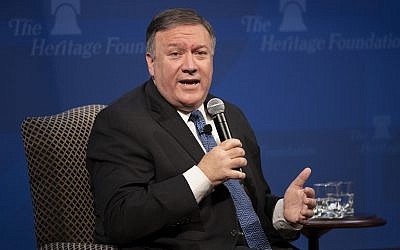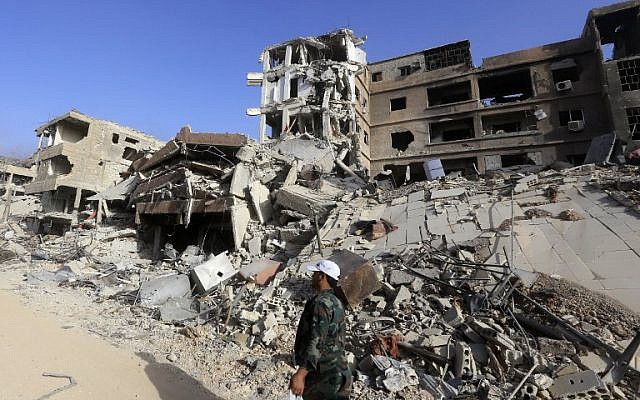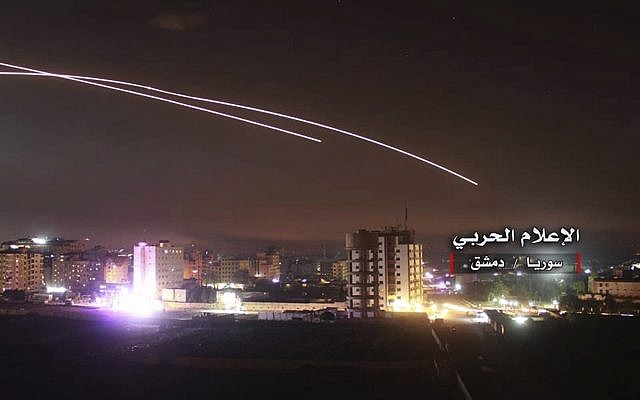The gains free Assad’s forces to move on remaining rebel-held territory in the south near the border with Israel

BEIRUT (AP) — Syria’s military on Monday captured an enclave in southern Damascus from Islamic State militants following a ruinous monthlong battle, bringing the entire capital and its far-flung suburbs under full government control for the first time since the civil war began in 2011.
The gains freed President Bashar Assad’s forces to move with allied militiamen on remaining rebel-held territory in the south near the border with Israel, as Syria’s chief ally Iran comes under growing pressure from the Trump administration to withdraw its troops from the country.
Iranian-backed militias, including the Lebanese terror group Hezbollah, have been instrumental in helping Assad’s over-stretched forces recapture huge areas around Damascus and in the country’s center and north, building a military presence that has alarmed Israel and its US ally, which is now looking to constrain Iran’s activities.
Iranian officials have vowed to stay on in Syria for as long as needed, setting the stage for a potential confrontation as Washington seeks to tighten the screws on Tehran following the US withdrawal from the 2015 Iran nuclear deal brokered with Iran under President Barack Obama and world powers.
US Secretary of State Mike Pompeo threatened Iran with the “strongest sanctions in history” if Tehran doesn’t change course. In his first major foreign policy speech since taking the post as the top US diplomat, he issued a list of demands that he said should be included in any new nuclear treaty with Iran, including that it “withdraw all forces” from Syria, halt support for Hezbollah and stop threatening Israel.

Iran and Russia have joined forces in Syria, providing crucial military support to Assad’s forces and giving them the upper hand in the civil war.
Russian President Vladimir Putin told Assad at a meeting last week that a political settlement in Syria should encourage foreign countries to withdraw their troops from Syria. Putin’s envoy to Syria, Alexander Lavrentyev, said Putin was referring to Iranian forces, among others.
Iran says it is in Syria at the behest of the Assad government and says it is fighting “terrorism” in the form of Islamic extremists, including the Islamic State group and al-Qaida.
Iranian Foreign Ministry spokesman Bahram Ghasemi told reporters that no one can force Tehran to do anything it doesn’t want to do.
“Our presence in Syria has been based on a request by the Syrian government and Iran will continue its support as long as the Syrian government wants,” he said, speaking shortly before Pompeo made his remarks.
The recapture of IS-held pockets in the Palestinian refugee camp of Yarmouk and the nearby Hajar al-Aswad district in southern Damascus came after a massive bombing campaign that has all but decimated what was left of the residential area on the edge of the capital, once home to about 200,000 Palestinian refugees.

The camp has been deserted by most of its inhabitants following years of siege, and the few remaining residents fled to nearby areas in the last days of the bombardment.
The last push on the Yarmouk camp came after a group of civilians was evacuated overnight. State TV showed images of troops moving in, waving the Syrian flag and flashing victory signs atop wrecked buildings in the destroyed neighborhood. Some fired in the air in celebration.
The move boosts morale and security in Assad’s seat of power, putting it out of range of insurgents’ mortar fire and shells for the first time in nearly seven years.
With Iran’s help, Assad’s forces have been making steady gains since 2015, when Russian launched an air campaign on behalf of his forces. In December 2016, government forces captured rebel-held eastern neighborhoods of the northern city of Aleppo, in Assad’s biggest victory since the conflict began.
With a mix of military pressure and surrender deals brokered by Russia, thousands of opposition fighters capitulated and were evacuated in March and April from Damascus suburbs known as eastern Ghouta after a crushing government offensive.
Syrian troops and their allies are expected to turn their attention to opposition-held parts of southern Syria, including Daraa province, in a push that could bring allied Iranian forces even closer to the increasingly tense frontier with Israel. Idlib, in the north, remains a major rebel bastion, but government forces are expected to leave that confrontation to a later stage.
Israel has warned Iran and its proxies to stay away from the border and has carried out a series of airstrikes on Syrian air bases where it believes Iranian troops maintain a presence. Earlier this month, it launched a blistering bombardment of Iranian positions in Syria after an alleged Iranian rocket barrage toward its positions on the Golan Heights.

Gen. Ali Mayhoub, a Syrian army spokesman, declared Damascus and its surroundings “completely secure” on Monday.
A war monitoring group said about 1,600 people, including hundreds of IS gunmen, left the area Saturday and Sunday, heading toward the desert in the east of the country following a deal with the government. The Britain-based Syrian Observatory for Human Rights said the month of fighting left scores of dead on both sides.
Syrian TV earlier quoted an unidentified Syrian military official as saying the two-day truce had been in place to evacuate women, children and the elderly Sunday night from Hajar al-Aswad. Syrian state media denied a deal was reached to evacuate the militants.
“The Daesh terrorist organization was wiped out in Hajar al-Aswad,” an unidentified Syrian soldier told state TV, using an Arabic acronym to refer to IS. “We will keep marching until we liberate all parts of Syria.”
As reported by The Times of Israel
